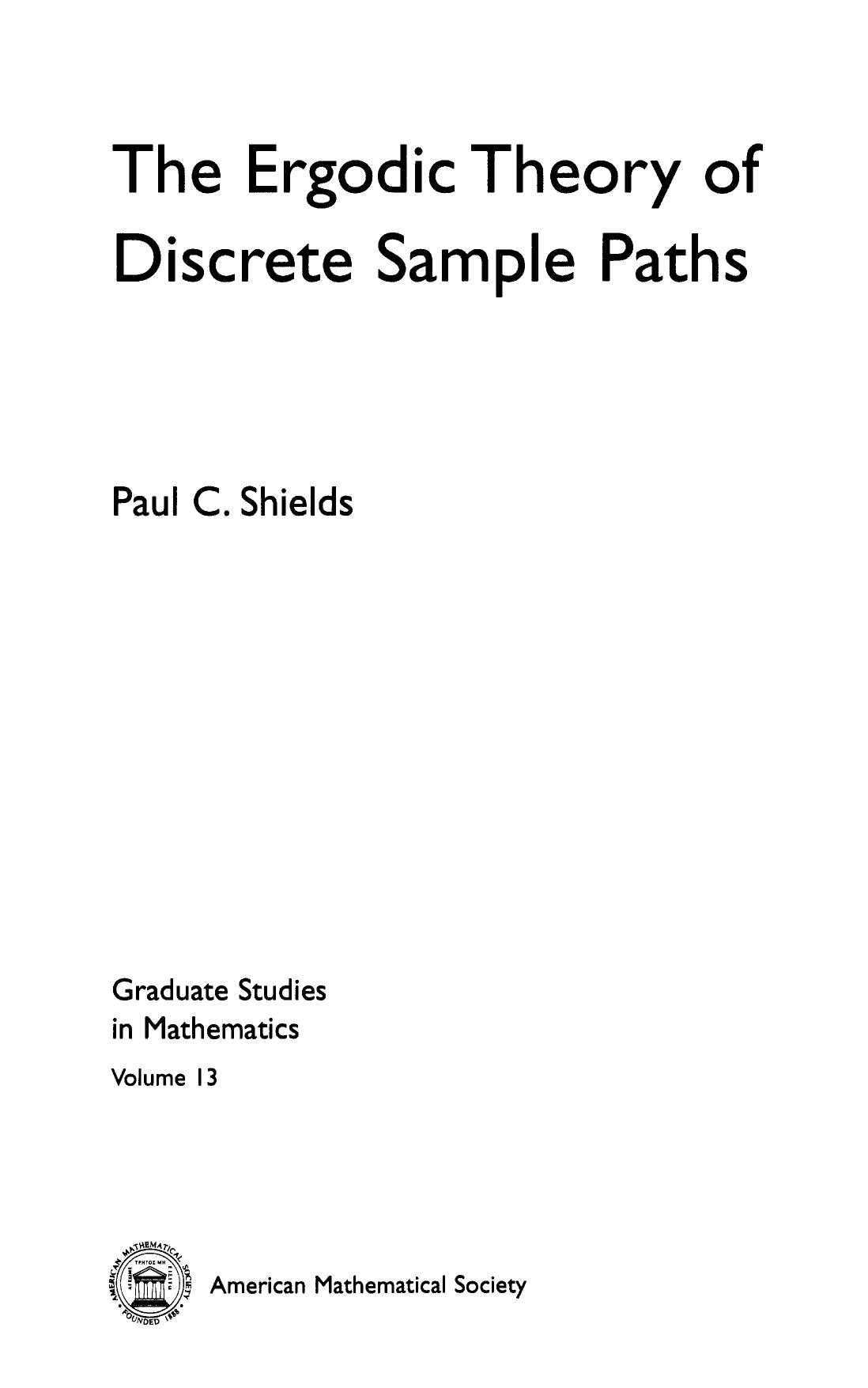Download The Ergodic Theory of Discrete Sample Paths (Graduate Studies in Mathematics 13) PDF Free - Full Version
Download The Ergodic Theory of Discrete Sample Paths (Graduate Studies in Mathematics 13) by Paul C. Shields in PDF format completely FREE. No registration required, no payment needed. Get instant access to this valuable resource on PDFdrive.to!
About The Ergodic Theory of Discrete Sample Paths (Graduate Studies in Mathematics 13)
<p>This book is about finite-alphabet stationary processes, which are important in</p><p>physics, engineering, and data compression. The book is designed for use in graduate</p><p>courses, seminars or self study for students or faculty with some background in measure</p><p>theory and probability theory. The focus is on the combinatorial properties of typical</p><p>finite sample paths drawn from a stationary, ergodic process. A primary goal, only</p><p>partially realized, is to develop a theory based directly on sample path arguments, with</p><p>minimal appeals to the probability formalism. A secondary goal is to give a careful</p><p>presentation of the many models for stationary finite-alphabet processes that have been</p><p>developed in probability theory, ergodic theory, and information theory.</p><p>The two basic tools for a sample path theory are a packing lemma, which shows how</p><p>"almost" packings of integer intervals can be extracted from coverings by overlapping</p><p>subintervals, and a counting lemma, which bounds the number of n-sequences that can</p><p>be partitioned into long blocks subject to the condition that most of them are drawn from</p><p>collections of known size. These two simple ideas, introduced by Ornstein and Weiss</p><p>in 1980, immediately yield the two fundamental theorems of ergodic theory, namely,</p><p>the ergodic theorem of Birkhoff and the entropy theorem of Shannon, McMillan, and</p><p>Breiman. The packing and counting ideas yield more than these two classical results,</p><p>however, for in combination with the ergodic and entropy theorems and further simple</p><p>combinatorial ideas they provide powerful tools for the study of sample paths. Much of</p><p>Chapter I and all of Chapter II are devoted to the development of these ideas.</p><p>The classical process models are based on independence ideas and include the i.i.d.</p><p>processes, Markov chains, instantaneous functions of Markov chains, and renewal and</p><p>regenerative processes. An important and simple class of such models is the class of</p><p>concatenated-block processes, that is, the processes obtained by independently concate-</p><p>nating fixed-length blocks according to some block distribution and randomizing the start.</p><p>Related models are obtained by block coding and randomizing the start, or by stationary</p><p>coding, an extension of the instantaneous function concept which allows the function to</p><p>depend on both past and future. All these models and more are introduced in the first</p><p>two sections of Chapter I. Further models, including the weak Bernoulli processes and</p><p>the important class of stationary codings of i.i.d. processes, are discussed in Chapter III</p><p>and Chapter IV.</p><p>Of particular note in the discussion of process models is how ergodic theorists think</p><p>of a stationary process, namely, as a measure-preserving transformation on a probability</p><p>space, together with a partition of the space. This point of view, introduced in Section 1.2,</p><p>leads directly to Kakutani's simple geometric representation of a process in terms of a</p><p>recurrent event, a representation that not only simplifies the discussion of stationary</p><p>renewal and regenerative processes but generalizes these concepts to the case where</p><p>times between recurrences are not assumed to be independent, but only stationary. A</p>
Detailed Information
| Author: | Paul C. Shields |
|---|---|
| Publication Year: | 1996 |
| Pages: | 258 |
| Language: | other |
| File Size: | 3.5815 |
| Format: | |
| Price: | FREE |
Safe & Secure Download - No registration required
Why Choose PDFdrive for Your Free The Ergodic Theory of Discrete Sample Paths (Graduate Studies in Mathematics 13) Download?
- 100% Free: No hidden fees or subscriptions required for one book every day.
- No Registration: Immediate access is available without creating accounts for one book every day.
- Safe and Secure: Clean downloads without malware or viruses
- Multiple Formats: PDF, MOBI, Mpub,... optimized for all devices
- Educational Resource: Supporting knowledge sharing and learning
Frequently Asked Questions
Is it really free to download The Ergodic Theory of Discrete Sample Paths (Graduate Studies in Mathematics 13) PDF?
Yes, on https://PDFdrive.to you can download The Ergodic Theory of Discrete Sample Paths (Graduate Studies in Mathematics 13) by Paul C. Shields completely free. We don't require any payment, subscription, or registration to access this PDF file. For 3 books every day.
How can I read The Ergodic Theory of Discrete Sample Paths (Graduate Studies in Mathematics 13) on my mobile device?
After downloading The Ergodic Theory of Discrete Sample Paths (Graduate Studies in Mathematics 13) PDF, you can open it with any PDF reader app on your phone or tablet. We recommend using Adobe Acrobat Reader, Apple Books, or Google Play Books for the best reading experience.
Is this the full version of The Ergodic Theory of Discrete Sample Paths (Graduate Studies in Mathematics 13)?
Yes, this is the complete PDF version of The Ergodic Theory of Discrete Sample Paths (Graduate Studies in Mathematics 13) by Paul C. Shields. You will be able to read the entire content as in the printed version without missing any pages.
Is it legal to download The Ergodic Theory of Discrete Sample Paths (Graduate Studies in Mathematics 13) PDF for free?
https://PDFdrive.to provides links to free educational resources available online. We do not store any files on our servers. Please be aware of copyright laws in your country before downloading.
The materials shared are intended for research, educational, and personal use in accordance with fair use principles.

